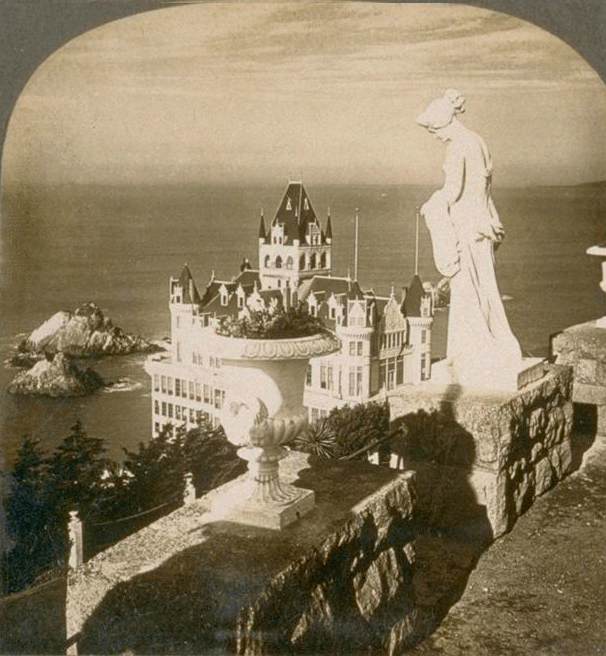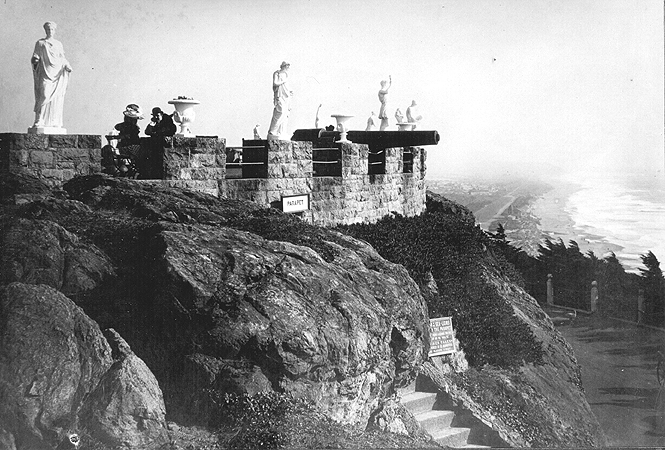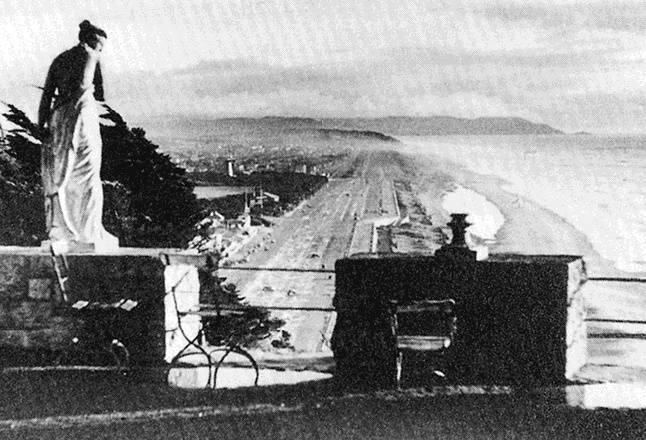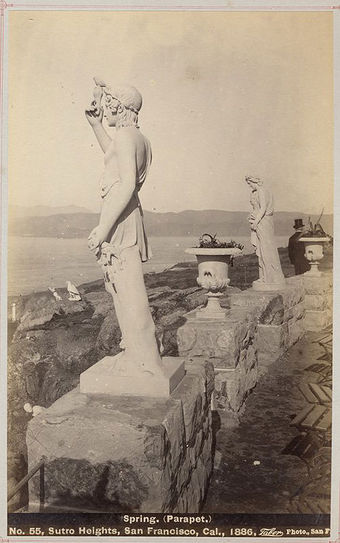The Mysterious Buried Statues of Sutro Park: Difference between revisions
(changed category from Richmond to Richmond District) |
(added photo) |
||
| Line 18: | Line 18: | ||
'''A Sutro Statue, looking south along the Great Highway.''' | '''A Sutro Statue, looking south along the Great Highway.''' | ||
''Photo: | ''Photo: Private Collection, San Francisco, CA'' | ||
Sutro Park provides the setting for one of the strangest buried treasure stories around. Only in this case, instead of gold, silver and jewels, the "treasure" consists of more than a dozen grecian-style statues that are supposedly buried somewhere in the Park. | Sutro Park provides the setting for one of the strangest buried treasure stories around. Only in this case, instead of gold, silver and jewels, the "treasure" consists of more than a dozen grecian-style statues that are supposedly buried somewhere in the Park. | ||
The story began in February, 1865, when a tobacco merchant and visionary engineer named Adolph Sutro approached financier Billy Ralston with a mad scheme: Sutro proposed to construct a seven-mile-long, two-thousand-foot-deep mining tunnel from one end of the Comstock Lode to the other. Ralston liked the idea; soon Sutro was touring the country, whipping up political and financial support for a project so improbable that the Gold Hills News (1869) called it "one of the most infamous and barefaced swindles ever put forth in Nevada." | [[Image:Spring-looking-out-to-the-ocean-1886-Isaiah-West-Taber-photographer C7inFeOU8AAE A9.jpg|340px|left]] The story began in February, 1865, when a tobacco merchant and visionary engineer named Adolph Sutro approached financier Billy Ralston with a mad scheme: Sutro proposed to construct a seven-mile-long, two-thousand-foot-deep mining tunnel from one end of the Comstock Lode to the other. Ralston liked the idea; soon Sutro was touring the country, whipping up political and financial support for a project so improbable that the Gold Hills News (1869) called it "one of the most infamous and barefaced swindles ever put forth in Nevada." | ||
The Sutro Tunnel, finished in 1878, was a financial bust for everyone but Sutro, who had secretly sold his stock just before it was completed. Sutro had known what the others didn't: The Comstock Lode was played out. Still, it was a hell of a tunnel. | The Sutro Tunnel, finished in 1878, was a financial bust for everyone but Sutro, who had secretly sold his stock just before it was completed. Sutro had known what the others didn't: The Comstock Lode was played out. Still, it was a hell of a tunnel. | ||
Revision as of 21:01, 28 March 2017
Primary Source
from a National Park Service brochure
Cliff House and Seal Rocks (Photographed by Keystone View Company)
Sutro Heights parapet with statues, 1890s.
Photo: Private Collection, San Francisco, CA
A Sutro Statue, looking south along the Great Highway.
Photo: Private Collection, San Francisco, CA
Sutro Park provides the setting for one of the strangest buried treasure stories around. Only in this case, instead of gold, silver and jewels, the "treasure" consists of more than a dozen grecian-style statues that are supposedly buried somewhere in the Park.
The story began in February, 1865, when a tobacco merchant and visionary engineer named Adolph Sutro approached financier Billy Ralston with a mad scheme: Sutro proposed to construct a seven-mile-long, two-thousand-foot-deep mining tunnel from one end of the Comstock Lode to the other. Ralston liked the idea; soon Sutro was touring the country, whipping up political and financial support for a project so improbable that the Gold Hills News (1869) called it "one of the most infamous and barefaced swindles ever put forth in Nevada."
The Sutro Tunnel, finished in 1878, was a financial bust for everyone but Sutro, who had secretly sold his stock just before it was completed. Sutro had known what the others didn't: The Comstock Lode was played out. Still, it was a hell of a tunnel.
Sutro retired to his mansion in what is now Sutro Park. In the 1890's he was elected Mayor of San Francisco. Somewhere along the line, he began acquiring the statuary which he placed along the oceanside rim of his property in a quixotic effort to bring classical high culture to the masses.
After Sutro's death, and his mansion's destruction, the statues were left in place along the rim of what became Sutro Park. Sometime during World War II, the statues disappeared, never to be seen again. What became of them?
A former Sutro Park gardener told historian Arthur Chandler that during World War II, the statues were buried at an unmarked location in the park. The reason? The authorities were afraid that the row of statues would make inviting targets for gunners aboard Japanese submarines! After the war, nobody bothered to unearth them, and eventually the location of the statues' burial was forgotten.
Apparently the mysterious statues still slumber somewhere beneath the ground of Sutro Park, awaiting the urban archaeologist who will, perhaps, one day decide to dig them up.




